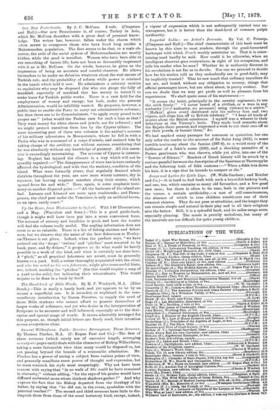Imperial India : an. Artist's Journals. By Val. C. Prinsep.
(Chapman and Hall.)—The chief characteristic of this book must be known by this time to most readers, through the good-humoured burlesque with which Punch weekly entertains us. That it is enter- taining need hardly be said. How could it be otherwise, when an intelligent observer goes everywhere, in right of his occupation, and tells his reader what he sees ? Whether he is uniformly discreet in his revelations is not for us to decide. Nor can we pretend to decide how far his stories, told as they undoubtedly are in good-faith, may be implicitly trusted ? That he saw much that ordinary travellers do not see, and heard, without any obligation to secresy, things that official personages know, but are silent about, is pretty evident. Nor can we doubt that we may get profit as well as pleasure from his experiences. We shall quote some of his statements :— "It seems the habit, principally in the cavalry regiments, to use the stick freely." "I never heard of a civilian, or a man in any authority [civil authority, we presume] using violence to a native." " [lolkar] gives every distressed ryot his railway fare and two rupees, and ships him off to British territory." "I hear all kinds of stories about the British subalterns. I myself was a witness to their behaviour at the Viceroy's levee. They made loud remarks about the Rajahs there present, and expressed a wish to cut their ears off to get their jewels, or bonnet them," &c.
We had marked many passages for comment or quotation, but can only refer the reader to the account of Sir Sales- Jung (312), to some terrible testimony about the famine (297-8), to a weird story of the fulfilment of a fakir's curse (390), and a shocking narrative of a Parsee gentleman who was thrown, while yet alive, into one of the "Towers of Silence." Readers of Greek history will be struck by a curious parallel between the description of the Spartans at Thermopylas and the following trait of Sikh customs :—" When a Sikh lets down his hair, it is a sign that he intends to conquer or die."


































 Previous page
Previous page